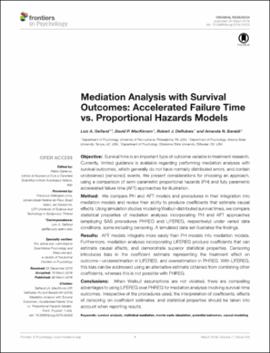| dc.contributor.author | Gelfand, Lois A. | |
| dc.contributor.author | MacKinnon, David P. | |
| dc.contributor.author | DeRubeis, Robert J. | |
| dc.contributor.author | Baraldi, Amanda | |
| dc.date.accessioned | 2019-09-25T18:24:37Z | |
| dc.date.available | 2019-09-25T18:24:37Z | |
| dc.date.issued | 2016-03-30 | |
| dc.identifier | oksd_gelfand_mediationanalys_2016 | |
| dc.identifier.citation | Gelfand, L. A., MacKinnon, D. P., DeRubeis, R. J., & Baraldi, A. (2016). Mediation analysis with survival outcomes: Accelerated failure time vs. proportional hazards models. Frontiers in Psychology, 7. https://doi.org/10.3389/fpsyg.2016.00423 | |
| dc.identifier.uri | https://hdl.handle.net/11244/321424 | |
| dc.description.abstract | Objective: Survival time is an important type of outcome variable in treatment research. Currently, limited guidance is available regarding performing mediation analyses with survival outcomes, which generally do not have normally distributed errors, and contain unobserved (censored) events. We present considerations for choosing an approach, using a comparison of semi-parametric proportional hazards (PH) and fully parametric accelerated failure time (AFT) approaches for illustration. | |
| dc.description.abstract | Method: We compare PH and AFT models and procedures in their integration into mediation models and review their ability to produce coefficients that estimate causal effects. Using simulation studies modeling Weibull-distributed survival times, we compare statistical properties of mediation analyses incorporating PH and AFT approaches (employing SAS procedures PHREG and LIFEREG, respectively) under varied data conditions, some including censoring. A simulated data set illustrates the findings. | |
| dc.description.abstract | Results: AFT models integrate more easily than PH models into mediation models. Furthermore, mediation analyses incorporating LIFEREG produce coefficients that can estimate causal effects, and demonstrate superior statistical properties. Censoring introduces bias in the coefficient estimate representing the treatment effect on outcome-underestimation in LIFEREG, and overestimation in PHREG. With LIFEREG, this bias can be addressed using an alternative estimate obtained from combining other coefficients, whereas this is not possible with PHREG. | |
| dc.description.abstract | Conclusions: When Weibull assumptions are not violated, there are compelling advantages to using LIFEREG over PHREG for mediation analyses involving survival-time outcomes. Irrespective of the procedures used, the interpretation of coefficients, effects of censoring on coefficient estimates, and statistical properties should be taken into account when reporting results. | |
| dc.format | application/pdf | |
| dc.language | en_US | |
| dc.publisher | Frontiers Media | |
| dc.rights | This material has been previously published. In the Oklahoma State University Library's institutional repository this version is made available through the open access principles and the terms of agreement/consent between the author(s) and the publisher. The permission policy on the use, reproduction or distribution of the material falls under fair use for educational, scholarship, and research purposes. Contact Digital Resources and Discovery Services at lib-dls@okstate.edu or 405-744-9161 for further information. | |
| dc.title | Mediation analysis with survival outcomes: Accelerated failure time vs. proportional hazards models | |
| osu.filename | oksd_gelfand_mediationanalys_2016.pdf | |
| dc.description.peerreview | Peer reviewed | |
| dc.identifier.doi | 10.3389/fpsyg.2016.00423 | |
| dc.description.department | Psychology | |
| dc.type.genre | Article | |
| dc.type.material | Text | |
| dc.subject.keywords | survival analysis | |
| dc.subject.keywords | statistical mediation | |
| dc.subject.keywords | monte carlo simulation | |
| dc.subject.keywords | potential outcomes | |
| dc.subject.keywords | causal modeling | |
